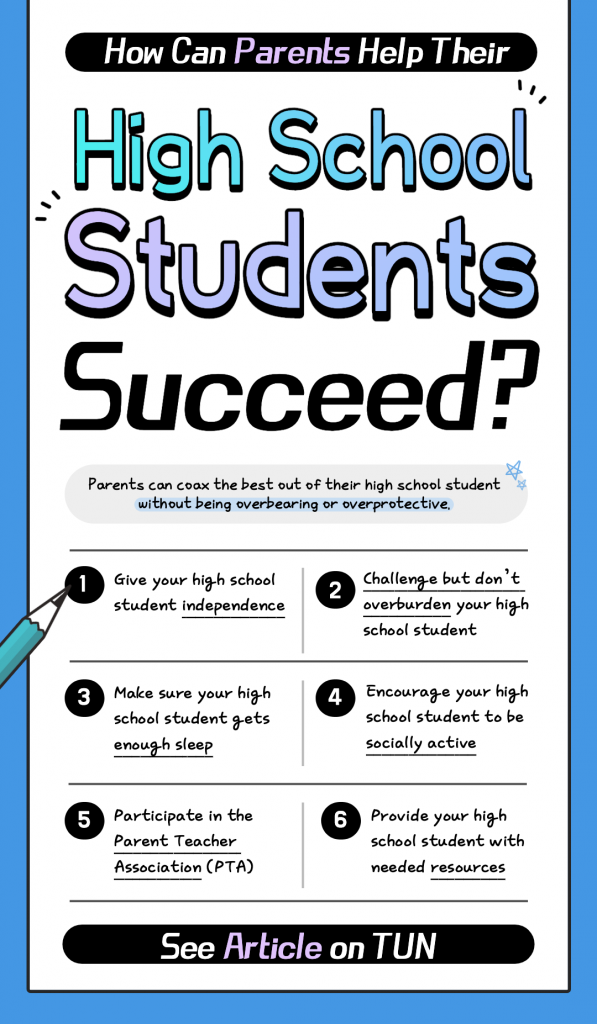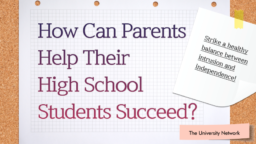By the time their children reach high school, many parents are unsure how involved to remain in their academic lives. Striking a healthy balance between intrusion and independence can be difficult. Parents naturally want to push their children to succeed, but heavy-handed parenting approaches can have detrimental, unintended consequences for children with certain personality traits.
By high school, students should be independently motivated and capable of handling the demands of school life on their own. However, parents can still coax the best out of their high school student without being overbearing or overprotective.
Here are six tips for parents of high school students who want to help them succeed:

Give your high school student independence
Hands-on parenting can be necessary at times, particularly when a child is falling far behind in school or is getting into legal trouble. However, in most circumstances, parents should begin to give their children more independence to complete daily activities and handle problems during their teenage years. For example, while it is common and even beneficial for parents to monitor their child’s homework completion during elementary and middle school, by high school, heavy-handed homework monitoring is unnecessary.
“To make it in the real world, they need the internal skills to find their way,” said Dr. Carry Barron, a psychologist at UT Austin’s Dell Medical School, in an article for Psychology Today. “Self-reliance is a great, if not essential asset. Autonomy is crucial for success in both work and love. A hands-off milieu is a great way to foster such independence.”
After high school, your child will be off to college, where they will most likely be living, studying, and working independently. Children should start developing the self-motivated mindset and responsible life-skills necessary to navigate college in their early high school years.
According to Barron, so-called “helicopter parenting” can foster “lower confidence, poor self-esteem, and a sense of helplessness.”
“Those given time, space, freedom and autonomy develop a deeply personal method of dealing with challenges as well as true competence,” she wrote. “Faced with uncertainty and adversity, they can pull from within.”
Challenge but don’t overburden your high school student
Pushing your high school student to work hard and explore new opportunities helps them build character, but it can also lead to overworking and stress. Eine Studie 2020 published in the Journal of Learning and Instruction found that nearly 80 percent of high school students reported feeling stressed and 58 percent reported feeling tired.
The pressures of high school and college applications can be burdensome, and stress can have significant negative consequences on a student’s mental health, sometimes leading to depression, anxiety, and cognitive issues. Academic stress can also negatively affect academic performance in the short and long term, leading to decreased motivation, increased risk of school dropout, and reduced likelihood of sustained employment in the future.
While it is undoubtedly important to motivate your child to succeed academically, overburdening them can have the opposite effect. If your high school student is unmotivated, sometimes it is best to give them some space and try to help them by providing positive encouragement, helping out with schoolwork when asked, and by having discussions about their goals and interests.
Make sure your high school student gets enough sleep
Sleep is both important and yet undervalued. Two out of three high school students sleep less than the 8 hours per day recommended by the CDC, and lack of sleep can have a variety of negative effects on mental health and cognitive function. Chronic lack of sleep can have long-term effects on memory, concentration, and overall mental health. It has been shown in manchen Fällen to lead to depression, increased risk of injury (particularly when driving), and substance abuse.
By setting suggested bedtimes on weekdays and encouraging your high school student to keep a regular sleep schedule, you can help them avoid some of the health issues commonly associated with sleep deprivation.
Encourage your high school student to be socially active
While academics are important, there is much more to life than doing well in school. It is important for young people to build strong social skills and develop a network of friends and peers that they can rely on.
Eine Studie by researchers at Pennsylvania State University and Duke University found that prosocial behavior in young children is a greater predictor of future success than academic ability. Social skills develop through childhood and adolescence and into early adulthood, when children tend to distance themselves from parents and spend more time independently or with friends. Desire for independence is a positive trait, and parents should encourage their children to socialize.
Childhood and adolescence are crucial stages in the development of healthy social behavior, so it is important for parents to encourage their children to be socially active at a young age and through the turbulence of young adulthood.
Participate in the Parent Teacher Association (PTA)
While it is not necessary to become overly involved in your high school student’s school, joining the PTA can be a great way to stay involved in their education without being intrusive in their day-to-day life. Parent involvement in education at a young age is crucial and is one of the best predictors of academic success. By high school, parents may not be as involved in their child’s daily life, but they can still have an influence on their education.
As PTA members, parents can develop relationships with their child’s teachers and principal and give their voice to major decisions that affect educational practices and school funding. PTAs enable an open dialogue between parents and students. They discuss a variety of issues, from tutoring programs to common disciplinary issues. They also allow administrators and parents to discuss budget appropriations or funding. Parents may use PTA meetings to voice any questions or concerns they may have.
Many parents stop attending PTA meetings after elementary or middle school, but they remain a great resource for parents, even at the high school level.
Provide your high school student with the resources they need to succeed (including yourself)
Parents are responsible for creating an environment at home that is conducive to learning. A strong learning environment gives students access to the resources they need to succeed, whether that be tutoring or a quiet, distraction-free space for studying. Additionally, parents should make sure their high school student has access to important material resources like study guides and organizers.
Most importantly, parents are the best resources. As a parent, if needed, you can be a study guide, a tutor, and an editor all at once for your high school student. If they need help with an upcoming test, for example, you can help them study by quizzing them or running through questions and concepts that they need to be familiar with. Furthermore, your mere presence and attentiveness will help build their confidence.
Zusammenfassung
High school is a turbulent time in a child’s life that is defined by change and independence. In order to help their high school student succeed in school and in life, parents should encourage them to handle problems independently, while maintaining an active role in their life and making themselves available when needed.



